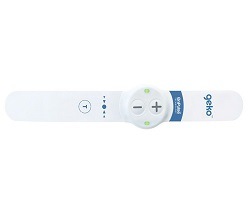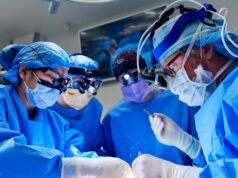
Researchers from the Lawson Health Research Institute at London Health Sciences Centre (LHSC) in London, Canada have reported that a simple medical device reduced swelling after kidney transplantation, as well as shortening hospital stays and decreasing surgical site infections, in a clinical trial published in the Canadian Urological Association Journal (CUAJ). The Geko device (Sky Medical Technology) is a small, wearable muscle pump activator that increases blood flow via painless electrical pulses.
Alp Sener, scientist and transplant surgeon in the Multi-Organ Transplant Program at LHSC (London, Canada), who lead the study, said: “After surgery, many of these organ recipients require a longer hospital stay due to delayed kidney function, infection, lack of mobility or oedema.
“The study results have been both surprising and exciting. Not only have we cut down wound infection rates, but we have also seen a considerable improvement in the new organ’s function following transplantation. Patients reported feeling more satisfied with the transplant process and are more mobile.”
The Geko device—which is made by UK-based company Sky Medical Technology and distributed in Canada by Trudell Healthcare Solutions—is non-invasive, self-adhering, battery-powered and recyclable, and is intended to be worn just below the knee. It generates neuromuscular electrostimulation and “unparalleled” systemic blood flow that equates to 60% of that achieved by walking. This is achieved via pain-free muscle contraction, which compresses deep veins in the lower legs to create increased blood flow in these vessels and return blood to the heart, according to a Sky Medical Technology press release.
In a randomised controlled clinical trial spanning two years, 221 transplant recipients at LHSC were prescribed either thrombo-embolus deterrent (TED) stockings and intermittent pneumatic compression (IPC), or the Geko device, for six days after surgery. The research team found that wearing the device increased urine output by 27% and lowered weight gain by more than one kilogram. With more urine produced and less fluid retention, patients experienced 31% less swelling and the duration of costly hospitalisation was shortened by more than one day following kidney transplantation, compared to the standard of care, while surgical site infections were also reduced by nearly 60%.
In a Sky Medical Technology press release, this reduction in wound infection rates was described “a striking observation”. Sener, who is also president of the Urologic Society for Transplantation and Renal Surgery, stated: “Transplant patients are at a higher risk of infection due to the immunosuppressant medications needed after surgery. Reducing infection means a much better outcome for the patient and, considering that recent data shows wound infections can cost the healthcare system thousands of dollars per person, it is a win-win situation.”
Some of the study participants wore pedometers to track their steps, and found that using the Geko device was also associated with improved mobility after surgery. The research team suspects this may be due to reduced swelling, which could improve ease and comfort when moving.
The Geko device has been adopted into the care pathway and is now being offered to patients at LHSC in recovery after receiving a new kidney. Sener added: “Using a muscle pump activator, like the Geko device, could be a game changer for other procedures like orthopaedic implants, where wound infection can have disastrous consequences, or in surgeries where wound infections are more common, such as in cancer and intestinal surgery.”











